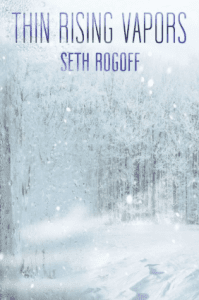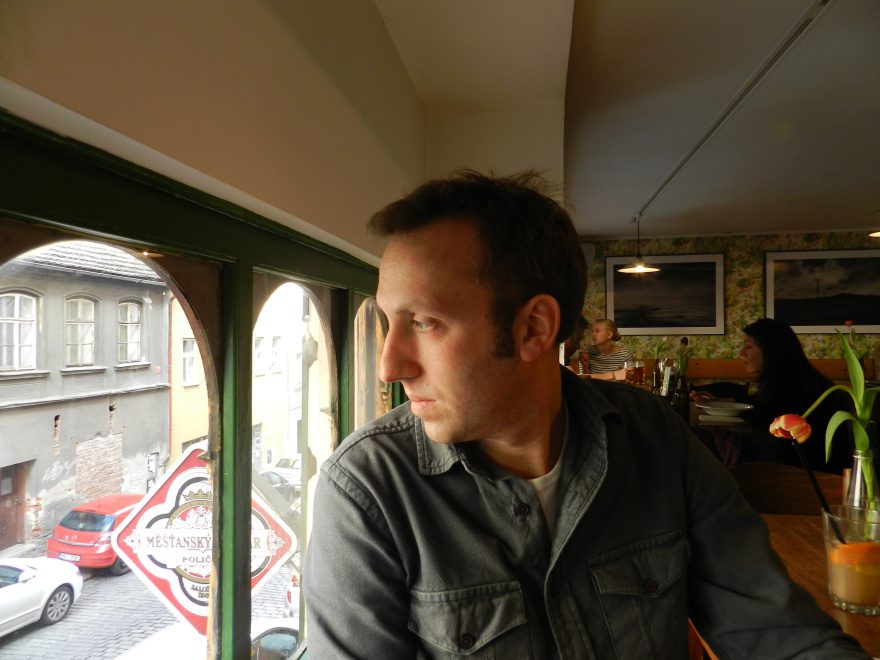 Thin Rising Vapors
Thin Rising Vapors
By Seth Rogoff
Sagging Meniscus Press, 2018
240 pages
We don’t read our friends’ personal diaries or emails not so much because it is bad to do so, but because we are afraid to find out something that we don’t want to know about them, or, even worse, about us. Seth Rogoff’s new novel explores the metaphysics of this paradox.
In Thin Rising Vapors (2018) Ezra Stern comes to the house of his extraordinary friend Abel Prager, who has mysteriously committed suicide in a remote cabin in Casco, Maine after having escaped from life in New York several years earlier. Ezra inherits Abel’s property and discovers that his friend has also left several thousand pages of written text describing episodes from the years he spent in reclusion. And so Ezra finds himself snowbound in the cabin with a story to read and the puzzle of his dead friend to solve. This mysterious set-up turns out to be a quiet drama of human relationships and self-knowledge.
Rogoff’s novel portrays Ezra’s account of seven days he spent in Casco trying to discover the truth about Abel in his papers. In turn, Abel’s writings are the book’s second narrative voice. From the very beginning, Rogoff’s narrative creatively interacts with several canonical texts. The most important literary figure for the plot is Henry David Thoreau, whose solitary life at Walden Pond is echoed by Abel’s retreat to the woods. Indeed, Abel insistently compares himself to the author of Walden and even includes some of Thoreau’s passages in his papers. There also seems to be a parallel between their life stories. Abel, like Thoreau, seeks to find spiritual harmony, a kind of enlightened state of mind, but for some reason cannot reach it.
Abel’s failure may be due to his awareness of the disruption between the great meanings described in literature and the minor truths of reality (which also seems reminiscent of Thoreau, whose books were far more harmonic than his life). In one episode in his papers Abel describes himself as “Ahab, only without a whale to pursue.” This reference to Melville’s Moby Dick is another example of how the novel’s characters appear to be torn between the abstract dimension of literature and the concrete dimension of life. Ezra experiences this disruption less intensively than Abel, who is constantly trying to apply the theoretical maxims of the great to his life, as if using books as self-help guides. The relationship between culture and the individual, the question of what defines what, is one of the most important issues raised in the novel.
Another important question that Thin Rising Vapors poses is that of the relationship between the author and the interpreter. In Rogoff’s novel it seems at first that Ezra is in charge of his narrative. He not only seems to control his actions, but he also decides what pieces of Abel’s papers are to be shown to the reader. But as the story proceeds, Abel’s voice grows more and more independent. His papers begin to occupy more and more pages in the book. Finally, it seems that Abel almost starts competing with Ezra for the role of the leading narrator. Soon his writings seem to be commenting on Ezra’s commentary. At the same time Ezra begins to think about his life in light of what he reads. He also begins to feel that he is losing control. He is afraid now that his longing to find out the truth about Abel might unsettle the universe that his friend has created: “It could be that there had been an original order and that I had disrupted it when I took the papers from the drawers and begun moving them around.”
Indeed, the cosmos of Abel’s papers is so vast, complex, and fragile that it can be disrupted unintentionally and easily. It consists of infinite bits of diverse knowledge arranged together: “poems, journal entries, transcription of quotes from Simone Weil, Kierkegaard, Defoe… miscellaneous pieces – observations, aphorisms, short vignettes.” Abel is a person who is lost in quotes and dreams about the past and the non-existent. His obsession with Thoreau and literary culture in general is so strong that he himself becomes an embodiment of it, a living abstraction. But his almost postmodern reliance on the thoughts of others is perhaps part of his tragedy. His life is flying away from him like the pages of books he has read. He is drowning in “the stormy sea of his mind, in a hurricane of mental life.”
Rogoff’s strategy in portraying Abel’s solitary drama is to show it as the conflict between dimensions that are fundamentally at odds with each other: theory and practice, past and present, biology and soul. Two of the novel’s most important symbols – water and mushrooms – contribute to this in a striking way. In one episode where Abel goes mushroom picking, Rogoff makes his protagonist use a naturalistic metaphor to convey a highly metaphysic concept: “I, too, came to love it, to love the mushroom and its power, the mushroom as life force of the forest, its mycelia forming an endless, labyrinthine network deep beneath the forest floor. It is a network of communication and symbiosis beyond our ability to comprehend. If we want to find nature’s secret… we need to follow the path of one of those thin threads that journey into the humus of the infinite.”
Just like these “thin threads,” the metaphor of “thin rising vapors” explains the secret connections between the book’s leitmotifs. The trope itself belongs to Thoreau, but the novel’s characters refer to it often as to a piece of wisdom that can reveal something about their circumstances. In a way it does. Vapor is a substance that may have once been solid as ice or changeable as water, but now it is all-penetrating as air itself. Vapor is a metaphor for culture. Thin rising vapors are the ephemeral signs of interaction of one thing with another, communication attempts that dissolve but never disappear completely. One of Ezra’s final realizations is that “everything relates to everything else.” With culture, with words and literature, this is very much so. Bits of meaning relate to each other just like atoms of diffused water.
Yet, cultural phenomena are more complex than those of nature, and at the end of the novel it is only the melting snow that liberates Ezra from his friend’s house, but not from his friend’s mental presence. Most of Abel’s papers remain undisclosed, suspended in Ezra’s mind like morning mist after a stormy night. In the end this leads to a paradoxical situation in which Ezra is simultaneously experiencing two contradictory things: calmness and incompleteness, a readiness to continue studying his friend’s papers and a willingness to give them up. Whereas the fact that Ezra decided to write the book supports the former state, there is still a sense of profound uncertainty in his voice. One way to find out the truth may be to trace Ezra’s steps back and recollect the clues that Rogoff has strategically spread throughout the novel.
One of Ludwig Wittgenstein’s best-known statements is that words are deeds. If so, interpretation can be compared to the full commitment of one person to another. This can be dangerous and tragic. This is why Ezra’s reading of his friend’s papers turns out to be such a difficult endeavor, a clash of different kinds of meaning, with the pangs of unexpected insights into his own self. Reading what a human being has written means not only letting someone else’s voice into your mind, but also opening your whole physical existence to possible changes. The outcomes are never predictable.
–Anton Romanenko
_____________________________________________________________________
ANTON ROMANENKO is a student of English and American studies, and Russian literature at Charles University in Prague.
